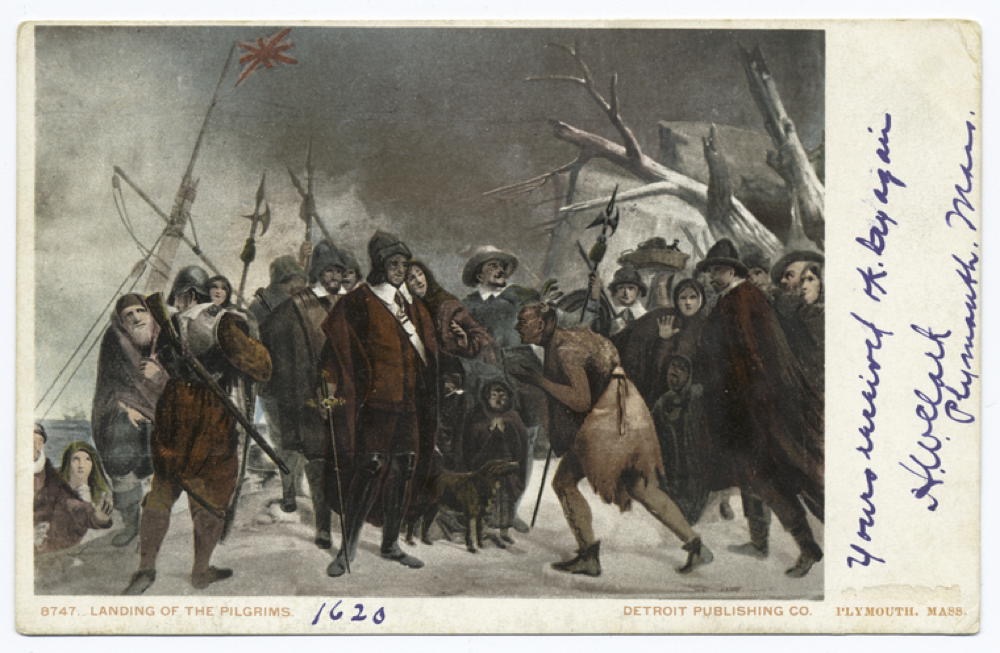PilGrimEconomics

Postcard: Landing of the Pilgrims, Plymouth, Mass. (1898 - 1931)
"Their future insisted upon first routing them through their distant past."
Today, our Pilgrim ancestors are most often characterized as religious people who fled Old World oppression to found a new world rooted in religious liberty. Most pilgrims didn't believe in religious freedom. Besides Roger Williams, who founded a break-away colony in Rhode Island, Pilgrims were the soul of intolerance. Their intolerance was not solely rooted in spiritual conviction but perhaps primarily in economics. They'd mortgaged themselves as well as their ideals to fund their colonies. Not even in the early seventeenth century did money grow on trees. A wealthy congregation member didn't fund their expedition; stock investors did. They fronted our ancestors with the explicit expectation that they would be repaid and expected to be repaid handsomely and quickly, for they imagined they'd outsmarted the market to get in on the bottom floor of unlimited profits. Wasn't that New World brimming with resources ripe for plundering?
As always, the wild-eyed investors wildly underestimated the challenge, as did their Pilgrim debtors. What we remember as an exercise of religious freedom was instead a wholesale experiment in economic slavery. The Pilgrims had quotas to meet and repayment schedules, mile-high expectations colliding with ground-level realities. Half the Plymouth colonists died over that first winter, huddling aboard ships without any better shelter. Neither investors nor colonists seriously considered the difficulty of creating adequate infrastructure before they could start reaping profits. Expectations nearly did them in, but this situation did not make them historically unique or special. The history of colonization seems defined by under-estimation and the consequent reactions of the frantically indebted. The primary salvation our founding fathers concerned themselves with was the one that would free them from their impossible debt burden. Those who died that first winter might be counted as the luckier ones.
My ancestors, Sewards, first appeared on this continent in the early sixteen-twenties, just a few years after those who founded the Plymouth colony. Mine might have been more fortunate, for they landed in present-day Connecticut off Long Island Sound, a more protected, slightly milder climate and more amenable ground. The locals welcomed them and ceded them some land, present-day Guilford, where they proceeded to build a settlement. I want to be clear on what I mean by settlement. The least of the landing Pilgrims had never known anything but standard early seventeenth-century infrastructure. The New World forced them to go back several centuries and live in wattle huts constructed from branches until they could construct anything more sturdy. Such construction would require several seasons of labor. The first winters would be spent huddling in waddle huts like their dark-ages ancestors had hundreds of years before. They were supremely unprepared for this challenge. Their future insisted upon first routing them through their distant past.
In my time, I watched as an upstart Amazon seemed to thrive without turning anything remotely resembling a profit for the first decade and more of its existence. Our Pilgrim ancestors outdid Bezos by decades. The Pilgrim investments eventually paid handsome profits, but not to the original investors. Their stocks had long before been sold at deep discounts to the seventeenth-century equivalent of junk bond brokers, whose inheritors reaped the profits. Before then, the most degrading behavior overtook our pious forebears. They treated each other like the slaves they were, punishing each other for the most minor infractions. They were imagining witches among them and murdering their own young. They picked fights with their native benefactors, slaughtering them in uncounted numbers and driving them from their formerly peaceful homelands. The Pilgrims eventually economically thrived after losing their souls to their indebtedness. They'd eventually divorce themselves from their original investors a hundred and fifty years after founding Plymouth Colony.
The great great grandsons of my Pilgrim ancestors would fight in our War of Independence and be granted land in former native country in upstate New York, where they would thrive and multiply. Their multiplication would drive further migration and fuel this nation's circulation system. The toehold my Pilgrim ancestors mortgaged their souls to gain returned the investment ten thousand fold and more. The last Seward in that line lies buried in my local cemetery; her life stretched from Gadsden County, Florida, where her parents chased a nineteenth-century bubble after Gadsden cleared out the native Seminoles, clear across the country, mainly motivated by economics. The threat of not surviving might have been the primary motivating force of her life, not the writing of family history or any soul's salvation. We are more of an economy today than we ever were a nation. Our histories seem almost entirely inadvertent. Our presence remains defined by who owes whom and how much anyone can borrow. In leverage, we trust. We mortgage rather than purchase our future. Always have. Probably always will.
©2024 by David A. Schmaltz - all rights reserved


